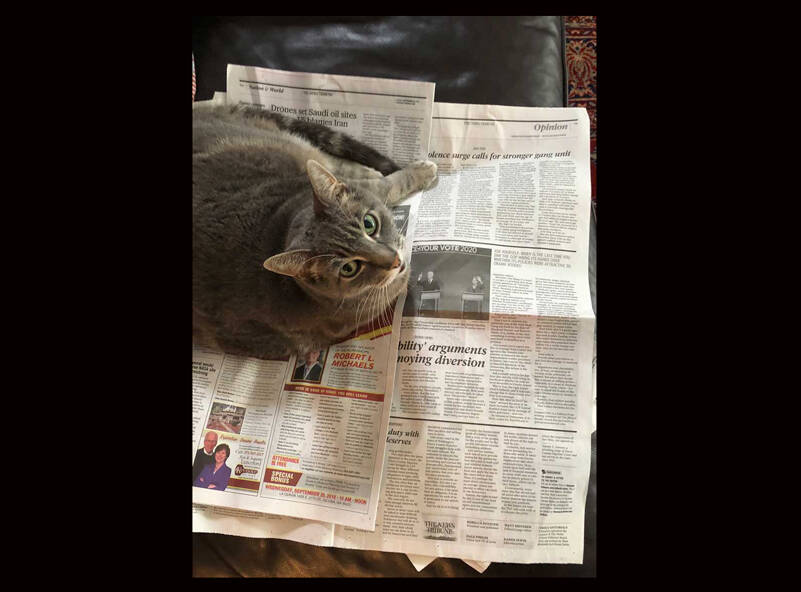By Morf Morford, Tacoma Daily Index
The Pen is mightier than the sword.
That once familiar saying held true for generations, if not centuries. Maybe even longer. But is it still true?
That simple premise is based on what was once a core assumption of any stable relatively civil society – an informed citizenry with a shared belief in truth, decency, reliable convincing evidence and a shared destiny.
You don’t need a degree in sociology or political science to know that few, if any, of those foundational characteristics flourish, or even exist, in most communities across our country.
And, without literacy and an informed citizenry, what do we have?
In place of reasoned arguments and compelling evidence we have shrill rantings, inflammatory memes and vague accusations. Politicians and cable news talking heads have gone from banal generalities and cliches to conspiratorial ravings.
Just recently, for example, I got an email from a conservative fund raising group telling me, in breathless terms, that Democrats, if elected, would “steal our children and our families”.
I have heard, over the years, similar stories about how “liberals” want to take our guns, our “rights” or almost anything else not tied down. The irony, though, is that “protection” from this “theft” often involves the loss of books, health care and job security.
The argument, in other words, is shrill and contradictory – but emotionally, if not intellectually, convincing. At least if “convincing” has come to mean, as it apparently already has, assurance that you were right and will continue to be right, and “those people” will always be “wrong”.
The “pen” in the proverb, implies the idea that the written, documented, word will prevail, that words matter and they, and the meaning they represent, will endure as something like a part of the permanent public record on any given issue.
Again, that presumes a literate audience willing to learn from and support those whose job it is to define, analyze and explain what goes on around us.
And, in yet another sense, that was then, and this is now.
Young people barely know that proverbial saying about the “pen” – but they wouldn’t believe it even if they did hear it.
And why would they? A recent in-depth survey of 16- to 40-year-olds shows that members of the Gen Z and Millennial generations are active consumers of news and information – but, as with everything else regarding young people, their relationship with the news is complicated.
For good reason, their trust in the press is low, many are experiencing digital fatigue, and they are besieged by, and vigilant to the point of obsession, about misinformation and manipulation in both traditional and social media.
They want news outlets to be fair to all sides, be neutral, and be accurate. They also want the news to provide diverse points of view, and to help people understand communities and people unlike their own.
In the era of dominant print media, for better or worse, the printed published word may not have been final, but it was, at minimum, recorded for all to see.
Social media and online news sites flicker, become viral or evaporate forever.
Websites can be altered or taken down completely.
As opposed to print publications, in 2015, 57% of Millennials reported using Facebook for news every day, and more recently, among those 16 to 24, 32% use Facebook for news every day.
Among young people, trust in the press is low, but so is trust in social media and local news fares better than national.
Young people, for good reason, have little trust in media. Or politics. Or religious institutions. Or law enforcement. Or authority in general.
But how could they?
The job of the press has always been to question and demand accountability from public figures. That is not what much of the public media has been doing the past decade or so.
Many politicians and bloggers have built lucrative careers by attacking our most basic of institutions, from higher education to government agencies to law enforcement to the electoral system itself.
As manipulators have done for millennia, they count on rage, division and panic to over-ride rationality and basic decency.
And to a degree most of us never expected to see, they are succeeding.
With no record, no written history, they can manipulate and distort the past into the formula of their agenda.
Critical thinking presumes a level of knowledge, and perhaps even a sense of what, not only has been done, but what has been possible, or even what has been aspired to by previous generations.
A flickering screen, like an evanescent, almost instinctive opinion, will pass, and blur into extinction.
Solid arguments, life philosophies, even poetry or song, will, thanks to the written word, prevail through the flurry of noise and pulsing photons.
There is nothing inherently more “true” about print media, but at least it doesn’t disappear when you question it.
Perhaps once again, we might come to believe that the pen is/was/will be mightier than the sword.





